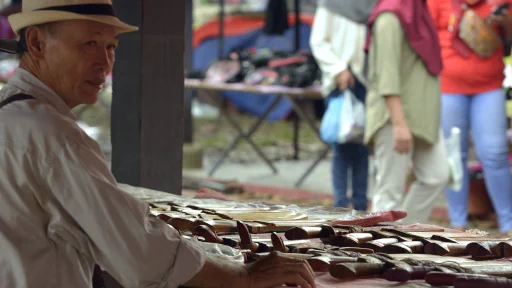Opinion Editorial November, 2025: Swiss Army Crabs

Creationists evolved their idea of "Intelligent Design" in lock step with the progressive discovery of scientific evidence in support of Darwinian evolution. Their flawed argument is that Darwinian evolution was God's master plan for eventually producing humans all along.
That is like arguing that the Bronze Age emerged as a deistic master plan with the Swiss Army knife as its ultimate goal. Or that the Swiss Army knife was intelligently designed for the sole purpose of setting up Robin Williams' comedy masterclass about it.
I've never owned a Swiss Army knife. But I know that the knives in this month's photo are not the missing link that finally proves "Intelligent Design." They have been crafted the same way by the indigenous Bajau people of Southeast Asia for a very long time. Just as I know that human intelligence did not evolve with the ultimate goal of establishing a multi-billion-dollar global online scamming industry. Otherwise, one of the world's most notorious scam centers, KK Park, would not have been raided and demolished in Burma (Myanmar) last month.
Yet Homo sapiens are the Swiss Army knife of the animal kingdom. Even a cursory look at the diversity of what we've achieved in our very short reign informs us of that. We invented writing, built huge structures, conquered smallpox and walked on the Moon. By the end of this month, Voyager I will be more than a light-day away from its creators. Most people alive today were not even born when it launched in 1977.
Andrew Mountbatten Windsor was. He was seventeen back then — the same age as his late, alleged sexual abuse victim. His pending "deportation" is likely to cost British tax payers more than £500. It's a good job their taxes will be increased in this month's budget.
In comparison, crabs have achieved very little over a much longer time; they still haven't invented the wheel, let alone worked out what color it should be. Yet there is more scientific evidence that they, not we, are the end goal of "Intelligent Design." We needn't worry that we will evolve into crabs though. They are simply one example of convergent evolution — an inevitable consequence of natural selection. Another newly discovered species of crab was confirmed in Australia just last month.
Nor have crabs navigated trade wars. But many businesses around the world are now having to do just that. Swiss companies are a prominent example due to the 39% import tariff recently announced by the US. Swatch responded in part with satire when it released a special edition watch that has the numerals 3 and 9 switched on its face.
For Swiss Army knife maker Victorinox, the strategy is more diverse. It is considering many options to navigate that 39% tariff. It could even be called the Swiss Army knife of tariff navigation. Because of tit-for-tat tariffs, consumers in many parts of the world may also need to become Swiss Army knives.
Wars are most often caused by disputes over land. But megalomania (often hiding behind religion) is usually a confounding factor. Wars share some traits with trade wars. Who will emerge as the desperately-needed Swiss Army knife of ending such wars? Perhaps the next evolution of Swiss Army crabs.
If you enjoyed reading this month's opinion editorial, please consider supporting independent, advertising-free journalism by buying us a coffee to help us cover the cost of hosting our web site. Please click on the link or scan the QR code. Thanks!














